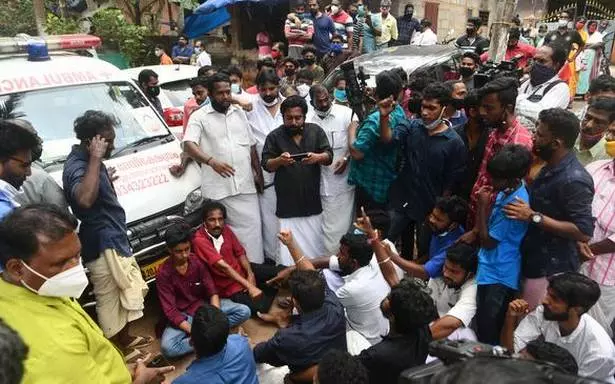
Questions raised by Kerala's eviction tragedy
text_fieldsLocals protest at the death of the couple during police action for eviction
The tragic death of a couple in Kerala, who were living in a temporary shed in a colony in Pongil, Neyyattinkara near capital Thiruvananthapuram has sent the state into shock and protest, to nobody's surprise. When the police came to the family with an eviction order on 22 December, the couple, Rajan and Ambili entreated the police to wait for a while in anticipation of a stay on the court order. They committed suicide when the police did not budge. Reports say that originally they had no intention of suicide, but that when police officials showed no mercy, the two threatened to self-immolate by lighting a cigar lighter after pouring petrol all over their body. When the police rejected their demand and went ahead enforcing the court order, they ignited the lighter. The police tried to snatch away the lighter, but by a slip it fell on the couple and led to the fire. Although they were rushed to hospital, both succumbed to the fire.
Although the eviction order was issued by the court on the petition by the land owner on whose plot they had built a shed, the order staying that was received within hours from then. But the policemen did not show the patience to wait till then; in addition, the locals allege, that the police were apparently in a hurry to execute the order before the arrival of the stay. The suicide note of Rajan also states so. State police chief Lokanath Behara has issued orders to probe the heart-rending incident, and chief minister Pinarayi Vijayan has informed that the government would give land and house to the bereaved children. Organisations like the Youth Congress have also come forward to arrange the education of the two sons of the deceased and their rehabilitation. It is quite natural for such tragedies to inspire philanthropic responses. Appropriate action against the responsible officials can also be expected soon.
But all this should not make us blind to two serious issues involved. One, why our law enforcers are not able to adopt a humanitarian approach, in spite of a court order. Needless to say that the relief and rehabilitation actions of the government or non-government organisations after the victims lose their lives, cannot give back to the bereaved children the life of their parents or the love and protection due from them. The tragic picture of their father and mother melting in fire will definitely haunt them throughout their life. And no material relief will compensate for this agony. Further, the situation forcing two sons to dig the grave for their parents with their own hands is beyond any imagination. The imperative therefore, is to ensure that the law-enforcing personnel are trained and obliged to be aware that the prime goal in any situation is to save lives. Probe, suspension or dismissal post incident, even if they take place as due, will not offer a real solution.
The second question is why the alternating governments of the left and right fronts in Kerala failed to provide even three cents of land to build a hut to a large section of the population. The first Communist government that came to office on the formation of Kerala state and the succeeding Congress alliance government equally stake a claim to having implemented land reforms law. The ceiling for a family's land holding was set at 15 acres and surplus land was confiscated, but the truth at present is that unfortunate families abound without a piece of land to build a humble home or to bury their dead, creating an unforgivable and humiliating state of affairs. The recent Oommen Chandy government had assured three cents to the landless, but his government left office without fulfilling it. And the Pinarayi government, which had come to power with a loud claim to set everything right, has only a few months left in its term, when the huge number of people without land or home still raises a question mark. And that is why Rajan, who works as a carpenter for a living, had to depend on another's land for shelter, and then the landowner approached the court for eviction thereby securing a favourable court order.
There is a song Keralites still chant 'man does not have space in soil to lay his head' but without realising that it still represents a picture of abject misery yearning for urgent solution. And this at a time when tens of thousands of acres of land lie in the name, and under cover of plantation land lie idle. And a large number of encroachers have got into them, secured genuine or fake title and built resorts in them. The history of the Communist chief minister VS Achuthanandan having initiated some confiscation measures and then the move being defeated by those including his own party men, is a history too recent to forget. The current Pinarayi government is engrossed in blowing the trumpet of projects to be completed in 100 days. But still the question Kerala hears loud is whether any front is ready to ensure a minimum of land for the landless even at the cost of re-defining the ceiling of land holding.























